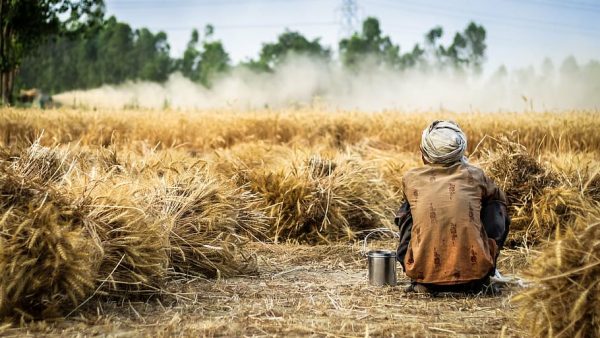On August 19, 2020, workers from All India Kisan Sabha (AIKS), Alliance for Sustainable and Holistic Agriculture (ASHA), Mahila Kisan Adhikar Manch (MAKAAM), Nation for Farmers, National Fishworkers Forum (NFF) and Focus on the Global South, brought together diverse voices on the failure of the present government to address the crisis in agriculture and allied sectors.
The panelists were: Hannan Mollah from the All India Kisan Sabha (AIKS), Prof R Ramakumar from the Tata Institute of Social Studies (TISS), Vijoo Krishnan (AIKS), Rani More, a farmer from Maharashtra, Jitendra Chaudhury, former MP from Tripura, T Peter from the National Fishworkers Forum (NFF), Kavitha Kuruganti from Alliance for Sustainable and Holistic Agriculture (ASHA), Dr. Neelam Gorhe of the Shiv Sena and Deputy Chairperson of the Maharashtra Legislative Council, Yogendra Yadav from Swaraj Abhiyan, and P Sainath of Nation for Farmers.
They brought forth pressing issues such as the failure of the government to address the impact of the COVID pandemic on Indian agriculture and allied sectors. Additionally, the drawbacks of Electricity (Amendment) Bill 2020 were highlighted. Testimonies from farmers emphasised the problem of “invisiblising women farmers” in agriculture policy and lack of access to credit, support infrastructure, and market linkages. They demanded an urgent special session of Parliament and state assemblies to exclusively discuss the agrarian crisis and related issues.

Peoples Parliament: Agrarian Crisis Deepened During COVID Pandemic Due To Flawed Government Response
From across India, farmers, fishworkers, peasant leaders, researchers, elected representatives and civil society platforms made submissions on the failure of the Modi Government to address the crisis in agriculture and allied sectors.
Even as the Indian Parliament is yet to begin its 2020 monsoon session, peasant movements and civil society organisations today organised a virtual People’s Parliament to bring to attention of Members of Parliament, media and the general public the impacts of the COVID pandemic on Indian agriculture and allied sectors. In the four hour session, all speakers were unanimous on the failure of the current regime to ensure adequate access to food, prevent the collapse of prices for farmers and fishworkers and ensure the health of rural workers as the pandemic quickly spread across India.
The session was presided over by Hannah Mollah from the All India Kisan Sabha (AIKS) who asserted that the Government abjectly failed to take up the issue of farmers. Farmers were unable to get remunerative prices and went deeper into debt during the pandemic period. Instead of responding to this, the government pushed through a slew of pro-corporate ordinances. Prof R Ramakumar from the Tata Institute of Social Studies (TISS) argued that all the three ordinances were undemocratic and would result in reduced crop prices and undermine seed and food security. Further, Vijoo Krishnan (AIKS) spoke about the Electricity (Amendment) Bill 2020 and the need to withdraw it.
Despite constituting a majority of the rural workforce, women in agriculture continue to be ignored by policy makers. In a powerful testimony Rani More, a farmer from Maharashtra spoke about how women are ‘invisiblised’ in agriculture policy as there was no access to credit, support infrastructure and market linkages. There were also testimonies from women who lost their land in Mamidiyala village, Siddipet district, Telangana to the proposed Kondapochamma reservoir and a woman farmer from Nagaland advocating for agro-ecological agriculture.
Jitendra Chaudhury, former MP from Tripura, and other speakers highlighted issues related to land and forest rights. Farmer leaders from Maharashtra and others also highlighted the plight of livestock and dairy farmers.
T Peter from the National Fishworkers Forum (NFF) said that the fishworkers rejected the Draft Fisheries Policy 2020 as it would further corporatize the sector by supporting aquaculture and mariculture. The NFF has resolved to begin agitations across the country in demand for the policy to be dropped.
Kavitha Kuruganti from Alliance for Sustainable and Holistic Agriculture (ASHA) made the case for (i) passing the Pesticide Management Bill after including amendments to strengthen the regulation of pesticide companies, (ii) banning 27 pesticides, as has been proposed by the government, immediately and (iii) promoting agro-ecological agriculture.
Dr. Neelam Gorhe of the Shiv Sena and Deputy Chairperson of the Maharashtra Legislative Council spoke with genuine concern, especially about the problems faced by women farmers. She also expressed solidarity with the issues raised in the Janta Parliament and said that she would raise them in the legislature.
In terms of the way forward to resolve the agrarian crisis, speakers highlighted the need for more public investment in agriculture, remunerative prices, public credit, land reforms, attention to human health and environment, promotion of cooperatives and collectives and specific policies to address issues faced by women in agriculture. Yogendra Yadav from Swaraj Abhiyan made a passionate case for Parliament to consider and pass the two bills advocated for by the All India Kisan Sangharsh Coordination Committee (AIKSCC): The Farmers’ Freedom from Indebtedness Bill, 2018 and The Farmers’ Right to Guaranteed Remunerative Minimum Support Prices for Agricultural Commodities Bill, 2018; to assure adequate MSP for farmers and to make them debt free.
In conclusion, the house adopted a series of resolutions that will be tabled before parliamentarians in the run-up to the monsoon session. These include the rejection of various undemocratic legislations that are being attempted to be pushed during the COVID crisis. These include the three agriculture ordinances, rejection of the 2020 draft fisheries policy, rejection of the 2020 electricity amendment bill.
The house also demanded an urgent special session of Parliament and state assemblies to exclusively discuss the agrarian crisis and related issues. This point was eloquently made by P Sainath of Nation for Farmers.




